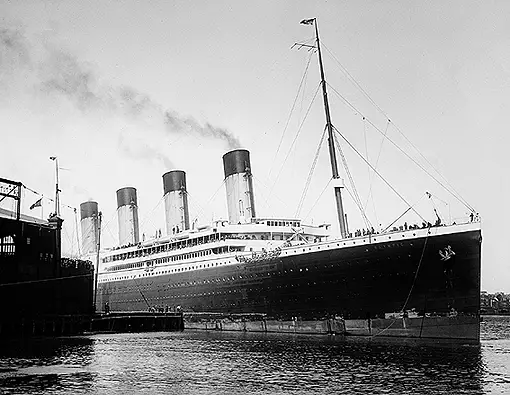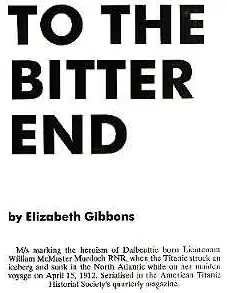8. The Olympic
Napoleon's habit of asking "Is he lucky?" about officers recommended to him was not an isolated eccentricity; the presumption of "luck", a tic in the Western logical tradition, recurs century after century in various disguises but always implies supernatural protection. Murdoch was lucky. And so, in June of 1911, he was appointed First Officer on the newest and largest liner afloat, R.M.S. Olympic.
The Olympic left on her maiden voyage at a moment of celebration, sharing newspaper space with the coronation of King George V. The ship seemed almost an extension of the meticulously described royal glamour twin symbols of stability and progress which might be presumed to go on forever. Thousands of New Yorkers flocked to Fire Island in the middle of the night to catch a first glimpse of the Olympic steaming from the east; the New York Times dutifully reported that the marine observer on Fire Island saw her incoming at "full speed", hours ahead of schedule, at 12:17 am, June 21, 1911.
Thousands more waited at the pier to watch 12 tugboats berth her, and by June 24th 4,000 people for whom a first class passage would cost more than they could earn in a year had paid to tour the ship while she lay at the White Star docks, just as they paid their pennies to read about the revelry at Buckingham Palace, and for the same reason. Mayor Gaynor was the Captain's luncheon guest on June 27th, and on the 29th, 10,000 people watched her first New York departure. Some 8,000 more visitors had swamped the Olympic on sailing day, and had to be laboriously shooed back onto the docks before 12 tugs could pull her out into the channel.

Olympic arriving in New York on her maiden voyage, June 21, 1911
with Captain Smith visible on the bridge. (Click to enlarge)
A flotilla of small ships escorted the Olympic, carrying a record 1,205 first class passengers, out toward the Atlantic, homeward bound, and while exiting New York Harbor a chilling little preview of the future occurred. Aviator Thomas Sopwith, of whom the world would hear more later, flew over the Olympic and tried to drop a package onto her deck from 1,000 feet above the funnels. (He missed.) Whether Captain Smith, Chief Officer Henry Wilde and First Officer Murdoch enjoyed Sopwith's stunt as much as the public is unknown, but being swooped upon by an airplane was a novel and unmenacing experience; all three would be dead before the first airplane dropped a bomb on a civilian target, in the First Balkan War, seven months after the loss of the Titanic.
There had been only one untoward moment to mar Olympic's spectacular reception. As she was docked, a slight touch ahead on one propeller was ordered to fit her more snugly against the pier. The tug Oliver Hackensack was sucked against the liner by the unexpected sudden force, and severely damaged. Murdoch, at his post in the stern, would have had an excellent view of the incident. Statutes of limitation governing claims are generous in admiralty law, but it is interesting to note that the tug owner and his attorneys did not file an action for damages against White Star until after the loss of the Titanic, which is to say, not until after they knew from the newspapers that Murdoch and Captain Smith were dead and could not appear as witnesses.
The maiden voyage of the Olympic, like the Coronation festivities in London, was in fact the swan song of the Old Order; and while still on her way to America, tucked in among the photos and details of her appointments, was an ominous note. A wireless to the company from Captain Smith was published in the Times on June 20, 1911, in which he agreed that the new liner, still in mid Atlantic, was a marvel, but his only specific comment was that her speed exceeded Harland & Wolff's expectations. White Star's ships were not sleek speedsters like the great Cunarders, but a swift crossing was an obvious point for pride (and revenue in America, where "time is money".) The only way that Smith could know that the Olympic could go faster than her builders believed would be for him to be doing so. At the Senate Inquiry, great and vigorous efforts would be made by White Star officials to establish that speed was not a company priority, and perhaps it was not: nevertheless, on her first journey Olympic's untried engines pushed her speed ever upward, because Smith instructed (or allowed) his engineers to make them do so. It was a bad precedent.
